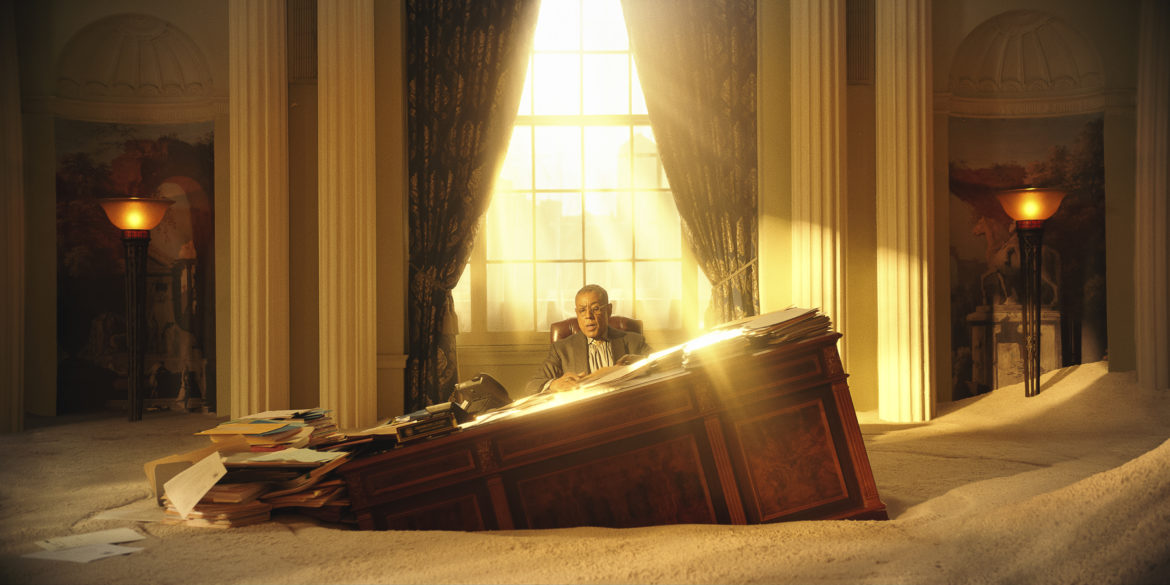Ostracized by critics and shunned by audiences, Francis Ford Coppola's civilizational fresco illuminates the ethical and aesthetic dilemmas of Western culture.
In the near future, the city of New Rome is in decline. Genius architect and artist Cesar Catilina (Adam Driver) calls for the city to be completely rebuilt according to his visionary plans. His ambition clashes with conservative mayor Franklyn Cicero (Giancarlo Esposito), a defender of tradition. His daughter Julia Cicero (Nathalie Emmanuel) falls in love with Cesar Catilina, thus initiating a love triangle in which she tries to find her place.
A film too topical to appeal to its time
The main plot of Megalopolis is based on references firmly anchored in the collective unconscious by the enduring themes of classical tragedy and the apprenticeship novel. At the same time, Francis Ford Coppola's testamentary project - forty years in the making - draws on an impressive array of references, which the filmmaker articulates with a notable expression of freedom that has more to do with free association than the usual scripting logics. While this constant and abundant evocation of the history of ideas makes for attentive observation and intense reflexive stimulation, it is understandable that, on the other hand, it can weary viewers who are eager for synthetic statements.
Nonetheless, this cinematic essay seems to have as its primary aim the transmission of its author's teachings, while anchoring the topicality of the ethical and aesthetic dilemmas driving our present-day societies in their civilizational heritage.
Western culture through the American example
By transposing New York into New Rome, the film questions the vitality and durability of Western culture, particularly as embodied in the American model. It highlights a civilization whose humanist, rational, ethical and aesthetic ideals - inherited from Antiquity and modernity - are in tension with contemporary social and political reality.
The United States, having invested heavily in the symbolic field to secure its composite cultural base, becomes a historical laboratory where the intellectual heritage of the West and the forces of tension between futuristic and backward-looking forms of idealism confront each other. Megalopolis invites us to reflect on the fragility of the concepts of progress, beauty and reason, and how a civilization can retain its values while being unable to embody them.
The golden age, a perpetual civilizational ideal
In addition to the breadth and density of the narrative, the director's exploration also invests the visual field as a space for thought: each monumental piece of architecture, each choreographed shot, becomes a means of reflecting on our aesthetic heritage. In this way, the city itself becomes the site of an infinite quest for perfection, where the Golden Age is not so much a past to be celebrated as a constant projection of a civilizational ideal to be attained.
Gold, both malleable and unalterable, rare and particularly luminous, condenses a spectrum of symbolic meanings beyond compare. The film's overall golden hue reinforces the preciousness of the objects in question, while at the same time casting suspicion on them. The visual approach of Megalopolis also inspired the series of composite photographs presented in this special issue.
Our special issue «Suisse et Etats-Unis, d’hier à aujourd’hui» («Switzerland and the United States, past and present»)
It's difficult to perceive and accept the issues of the present for what they are, and not for what we'd like them to be. Thus, the discontent mainly expressed at the film's release is circumstantial. A testamentary work is destined for future generations: let's bet that they, sufficiently disillusioned by postmodern relativism and its consequences, will be happy to watch Francis Ford Coppola's tale of their origins and the fundamental tensions that make them up. Megalopolis may or may not have the chance to enjoy retrospective success.
Photographer by profession, Nicolas Brodard is a member of the editorial team of Regard Libre and was artistic director of special issue from which this article is taken.



